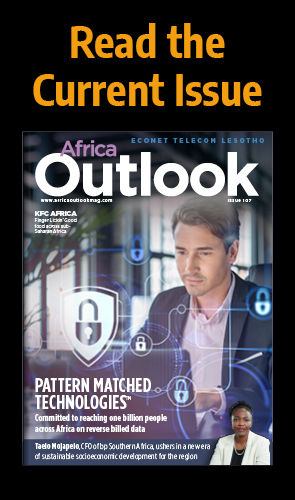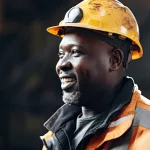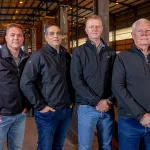Indwe Risk Services is a South African risk and insurance advisory business that is embracing technological innovation and digitisation.
CHANGING THE FACE OF INSURANCE
“I don’t think the insurance industry has ever been more exciting than right now. It is really a disruptive sector, with lots of opportunities to change the game.”
These words are spoken by Peter Olyott, CEO of Indwe Risk Services.
His view is authoritative, having worked in the insurance industry for close on 40 years. He started off his career as an underwriting clerk, before becoming a broker at Alexander Forbes (formerly Price Forbes), where he remained for two decades. After leaving the sector to work with a business process outsourcing company, he was convinced by the then CEO of Indwe to rejoin the industry. He arrived at Indwe in 2009, became the Managing Director in 2012 and the CEO in 2014. Furthermore, he holds a position as the President of the Financial Intermediaries Association of South Africa (FIA) and is a board member of the Insurance Institute of South Africa.
Indwe Risk Services is one of South Africa’s leading personal, business and specialist risk and insurance advisory businesses. It provides bespoke insurance solutions tailored to clients’ needs, which are underwritten by South Africa’s major insurers. It was founded in 2006 as the product of a merger between Thebe Risk Services and Pretasi Brokers, established in 1903 and 1972 respectively. The company took the name ‘Indwe’, the isiXhosa and isiZulu word for ‘blue crane’, which is South Africa’s national bird, as a nod to its national heritage.
With its decades of experience, Indwe is a key player in an industry that Olyott says is rapidly changing.
“In today’s world the clients are more demanding. They require greater depth of knowledge, more advice and they want it quicker and cheaper, and they want it instantaneously so you can’t dictate when they come to you; they decide for themselves,” the CEO explains.
“I think the excitement centres on the increasingly pervasive role of technology within all aspects of the business, from the advice to the products and the services.”
COVID-19: A TECHNOLOGY ACCELERATOR
As with many sectors, the necessity for digitisation has been highlighted by the COVID-19 pandemic.
“What it has done, in short, is accelerated the future,” Olyott says.
Indwe had planned on ‘going virtual’ in a few years’ time. But in March it had to transition to remote working practically overnight, as South Africa went into lockdown. Its bricks and mortar office became obsolete, to be replaced by virtual offices and online meetings. To the CEO, it was remarkable how quickly the company adapted, and how easily it could continue providing services to clients.
“Funny how when you’re under pressure and don’t have a lot of choice, things become a lot easier,” he says. “Nobody is debating the pros and cons because there isn’t an option. And if you wanted to stay in business you just had to adapt.”
One of the main ways in which Indwe adapted was through training its staff to use digital platforms to interact with clients online.
“You have a meeting online where everyone is about two centimetres high, which is very different to meeting face to face. The body language is pretty one-dimensional; it’s a bit like being on live television and a lot of people are not used to that,” the CEO says.
All of Indwe’s staff – including those from the sales, marketing and service divisions – are being provided with media training to improve how they present themselves on virtual platforms, with further specialised training for those who need it in their roles. Although Indwe might go back to some face-to-face meetings, the CEO believes that the company’s future is virtual. Before the pandemic, it had already established its first virtual office in Limpopo, which it will be running as a pilot project over the upcoming year. It is likely that Indwe will expand this model into Southern Africa, something that will allow it to operate in multiple new locations.
“Before, you had to pay for the cost of bricks and mortar, but now, as long as you’ve got bandwidth and Wi-Fi, you can basically employ in a lot of different towns, without going to the expense of setting up an office,” Olyott explains.
COVID-19 has also accelerated Indwe’s digitised sales and marketing strategy. It recently launched its first app, BluPixl, which it has been working on for the past couple of years. The app allows customers to compare and purchase insurance solutions on their phones; request quotes and get advice on managing policies and submitting claims through a chatbot.
“In launching BluPixl, we want to bring convenience, choice and customisation to the fingertips of South Africans. Not only does the platform enable consumers to shop and experience insurance the same way they do with everyday goods and services, it also serves to assist them in making informed choices,” the CEO says.
EMBRACING DIGITISATION
According to Olyott, Indwe plans to stay ahead of the curve by embracing digital innovations.
“Our main focus is integrating technology into everything that we do,” he explains.
In November 2019, the company launched RiskTech®, a drone survey and risk identification offering. Drones are a safe and accurate way to quickly acquire high-quality aerial images, and can also be used for 3D modelling, thermal imaging and terrain analysis. They can be used alongside other technologies (such as ground-penetrating radar, or GPR) to conduct comprehensive assessments of energy distribution networks, water treatment plants and much more, identifying environmental and mechanical risks. This assessment enables insurance cover to be fine-tuned, and claims to be fast-tracked more quickly, meaning drone technology is not just a game changer in insurance surveys, but also in crisis management.
“The business really seems to be taking off, pardon the pun,” Olyott quips.
Indwe has also integrated all its clients onto GIS mapping. “If a disaster should strike in South Africa, we can isolate our client businesses and give immediate advice and updates, as well as quickly find out how many clients will be affected. It will improve our response to clients when these things occur,” the CEO continues.
Research and Development is an integral part of Indwe’s offering as an organisation – the fact that Olyott has a background in R&D should come as no surprise.
“Insurance is notoriously behind the times,” he says. “Some of the products we sell today are products we sold when I entered the industry, which tells you a lot. We are pushing to upgrade products to the requirements of today’s consumer-led business, and we use technology to do that.”
But it is not just its technological aptitude that stands Indwe apart. The company also boasts decades of sectoral expertise of the integration of risk management and insurance. It is 100 percent locally owned, which means it can make decisions quickly, without having to consult any international shareholders. But in this case, local does not mean small.
“We are probably in the top five in terms of size, including the international companies as well. We have a very strong branch network and partners across Africa,” Olyott says.
Indwe is committed to expanding its offering. It recently branched out into broader financial services, providing life insurance, pensions and retirement funding in partnership with Sanlam. Furthermore, it has also recently launched a new business, Acuideas, an insurance product and service distributor of independent brokers – a venture enabling Indwe to focus on helping develop emerging black businesses.
But despite its ambitious and expanding offerings, the company continues to focus on what is most important – the client.
It adopts an “Ubuntu” approach to business, a Nguna Bantu term referring to the essential virtues of humanity and compassion. It will not pursue any business goals that compromise its integrity, and prefers to engage in sustainable, long-term partnerships with clients – hence its preference for providing customer-centric, bespoke insurance solutions.
“For our commercial clients we have something called a business review guide, and it’s not an insurance tick box, it means really understanding the client’s business. We can marry that customer business knowledge to insurance and provide a more bespoke offering,” Olyott explains.
EMPOWERING THE SECTOR
The “Ubuntu” approach also informs Indwe’s approach to the sector, where it is a key player in championing black empowerment. It puts the principles of B-BBEE (Broad-Based Black Economic Empowerment) into practice through a number of initiatives. First, it aims to advance transformation and equal representation within Indwe (which extends to gender as well as race). It is also committed to upliftment of the communities in which it operates, through focussed CSR initiatives.
The firm is also an accredited training provider, offering training and skills development programmes for employees. Bursaries and loans are on offer for those staff members desiring to go onto further study. Furthermore, it runs a year-long training programme equipping graduates for future employment within the insurance industry. The scheme is based on empowerment principles and has been developed to address the shortage of black professionals in the sector.
Another part of Indwe’s empowerment initiative is Project 300 – the goal of establishing at least 300 more black insurance brokers over the next few years across the country. It plays an ever-increasing role in developing independent black brokers through its Acuideas business and, in his position as President of the FIA, Olyott further encourages more inclusion within the financial services sector.
“The man who runs the Acuideas business for me is also the chairman of the transformation council of the FIA. We will be looking to support even more black brokers with buying power, mentorship and coaching going into the future,” he says.
LOOKING FORWARD
Over the upcoming year, Indwe will continue to focus on its key goals of digitisation and black economic empowerment.
“We just want to carry on doing what we’ve been doing, but better,” Olyott says.
“The days of people trying to be all things to all people is gone. Specialisation and diversification are required – it’s impossible to be good at everything.”
Because of this, Indwe is seeking to diversify into sectors of the economy where it sees growth, and where there is an opportunity that matches its service offering. It is particularly interested in the rescue and conflict sectors, which require a lot of risk management – it is here that its newly developed RiskTech® will come to the fore.
And in a more general sense, it is clear that Indwe’s embracement of innovation will continue to stand it in good stead as the company continues to reinvent itself in the dynamic, rapidly transforming insurance sector.























